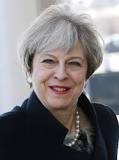The British Prime Minister, Theresa May, today said that 87 million Nigerians were living below poverty line, thereby making the country the home of the world’s highest number of poor people.
May, who made the remarks in Cape Town, South Africa, noted that although many Nigerians lived comfortably but that about 87 million Nigerians were living below the poverty line of $1 and 90 cents per day.
The UK leader explained: “Much of Nigeria is thriving, with many individuals enjoying the fruits of a resurgent economy, yet 87 million Nigerians live below $1 and 90 cents a day, making it home to more very poor people than any other nation in the world.”
“I am unashamed about the need to ensure that our aid program works for the UK. Today I am committing that our development spending will not only combat extreme poverty but at the same time tackle global challenges and support our own national interest.
“It is in the world’s interest to see that those jobs are created, to tackle the causes and symptoms of extremism and instability, to deal with migration flows and to encourage clean growth”, May added.
It would be recalled only last February, the African Development Bank (AfDB) in its 2018 Nigeria Economic Outlook had stated that 152 million Nigerians, representing almost 80 percent of the country’s estimated 193.3 million population, lived on less than $2 per day.
The bank stated: “Nigeria still faces significant challenges, including foreign exchange shortages, disruptions in fuel supply, power shortages and insecurity in some parts of the country.
“Revenue mobilisation efforts are insufficient; at five per cent, Value Added Tax rates are among the lowest in the world, and revenue administration is inefficient. Poverty is unacceptably high; nearly 80 per cent of Nigeria’s 190 million people live on less than $2 a day”, it added.
The conitental development finance institution projected, however, that recovery in oil prices and production would help stimulate growth and create fiscal space as the government sustains its key structural reforms to diversify the economy.
For instance, the bank pointed out faithful implementation of the Economic Recovery and Growth Plan (2017–20) held the potential of minimising the nation’s overdependence on oil as major foreign exchange earner.
Reacting to the bank’s position on the level of poverty in the country then, the Minister of Trade, Industry and Investment, Dr. Okechukwu Enelamah, said that the figures related to the period when Nigeria was in recession.
He quipped: “I think first we need to understand … there are reports that are lagging in indicators, which means people are reporting on history”.
Enelamah expressed the hope that current economic reforms of the government would lead to a reduction in poverty level in the country.






